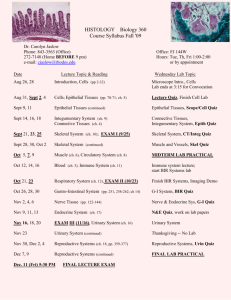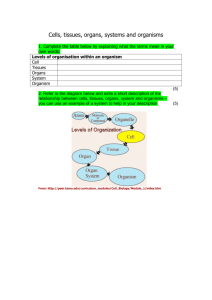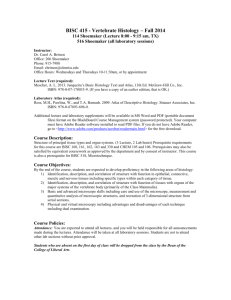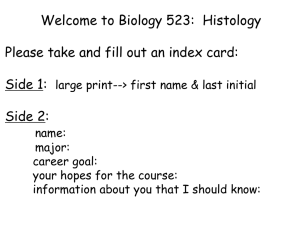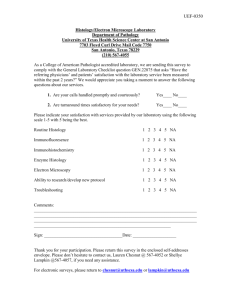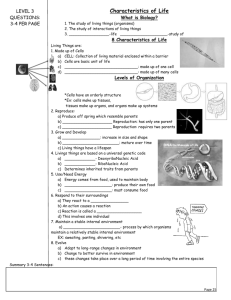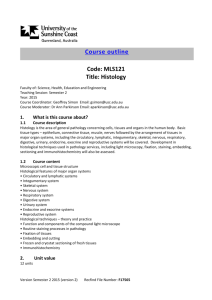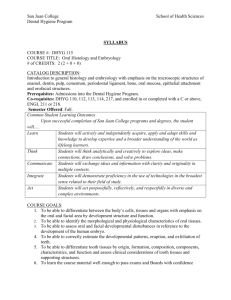Biology 304H Histology Course Outline Fall 2007
advertisement
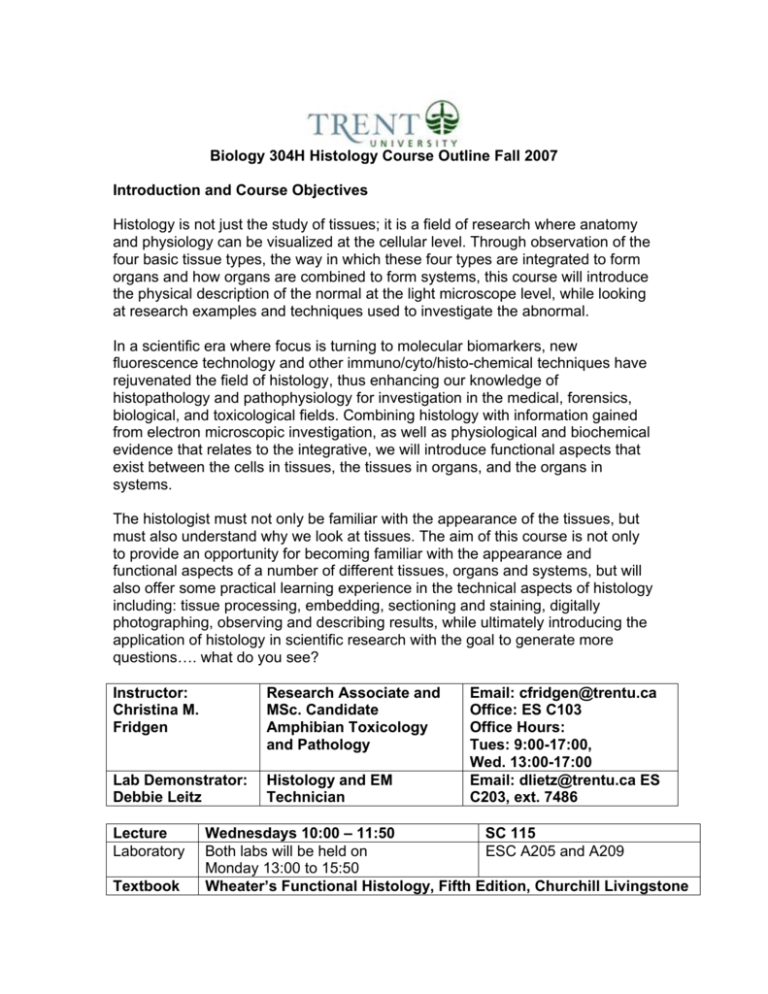
Biology 304H Histology Course Outline Fall 2007 Introduction and Course Objectives Histology is not just the study of tissues; it is a field of research where anatomy and physiology can be visualized at the cellular level. Through observation of the four basic tissue types, the way in which these four types are integrated to form organs and how organs are combined to form systems, this course will introduce the physical description of the normal at the light microscope level, while looking at research examples and techniques used to investigate the abnormal. In a scientific era where focus is turning to molecular biomarkers, new fluorescence technology and other immuno/cyto/histo-chemical techniques have rejuvenated the field of histology, thus enhancing our knowledge of histopathology and pathophysiology for investigation in the medical, forensics, biological, and toxicological fields. Combining histology with information gained from electron microscopic investigation, as well as physiological and biochemical evidence that relates to the integrative, we will introduce functional aspects that exist between the cells in tissues, the tissues in organs, and the organs in systems. The histologist must not only be familiar with the appearance of the tissues, but must also understand why we look at tissues. The aim of this course is not only to provide an opportunity for becoming familiar with the appearance and functional aspects of a number of different tissues, organs and systems, but will also offer some practical learning experience in the technical aspects of histology including: tissue processing, embedding, sectioning and staining, digitally photographing, observing and describing results, while ultimately introducing the application of histology in scientific research with the goal to generate more questions…. what do you see? Instructor: Christina M. Fridgen Research Associate and MSc. Candidate Amphibian Toxicology and Pathology Lab Demonstrator: Debbie Leitz Histology and EM Technician Lecture Laboratory Textbook Email: cfridgen@trentu.ca Office: ES C103 Office Hours: Tues: 9:00-17:00, Wed. 13:00-17:00 Email: dlietz@trentu.ca ES C203, ext. 7486 Wednesdays 10:00 – 11:50 SC 115 Both labs will be held on ESC A205 and A209 Monday 13:00 to 15:50 Wheater’s Functional Histology, Fifth Edition, Churchill Livingstone This syllabus, lecture objectives and notes, laboratory outlines, project description, the microtoming project outline and methods, as well as announcements and other course materials will be posted on Webct . Please be sure to check routinely for updates. Examination: Will cover both theoretical and practical aspects of the course and will be held during the formal examination period. Marking Scheme Submitted project* Quizzes (6x5%) Mid Term Final Exam 20% 30% 20% 30% Projects: Each student must submit a completed project as part of the requirement for completion of the course on or before the due date December 7th, 2007. Satisfactory completion of this component will include: • Tissues that have been sectioned, stained, and mounted on 5 clearly labeled slides must be submitted with the with best slide indicated for evaluation. Each student must independently perform all technical steps. • The write-up, as well as the presentation of micrographs and illustrations generated from your own slides, will be done following appropriate journal format. At least 3 references to primary research must be used in addition to other literature cited. Examples are available in the lab and should be consulted as a guide. Submission of Assignments and Late Submission Policy: Assignments are to be handed in to Debbie Lietz ES C203 by 4:00 p.m. on December 7, 2007. Assignments handed in after the due date will be penalized at the rate of 5% per day. Assignments submitted after Dec 14, 2007 will only be accepted for grading with a documented excuse and following a meeting with the course instructor. The lecture topics are given in the schedule below. It is highly recommended that students read pertinent chapters from the text before attending the lectures. Lab Topics will correspond to and follow as closely as possible, the lecture topics –with the lab content being covered the week after lecture. Laboratory Guides will be made available to you through WebCT. BRING TEXT BOOKS AND PRINTED LAB GUIDE TO LABORATORY SESSIONS!!!! Short quizzes will be held at the end of the laboratories as noted below to test your new knowledge –content accumulated from both the previous lecture and the current laboratory material. There will be no make-up quizzes, and the results from your best 6 will be used to calculate your final grade. BIOL 304H, HISTOLOGY SCHEDULE 2007 Week Lab (Monday) Lecture (Wednesday) -Microscope review -Introduction to Histology -Intro. to histological -Developmental Histology analysis (text Ch. 1, -Histological study at Trent appendix 2) -Intro. to Project Project Lab: -Cell Organization Week 2 -Rat dissection -Epithelial Tissue (Sept 17-21) -Microtoming safety -Muscle Tissue and techniques -Respiratory system Ch.5: Epithelial Tissue -Connective Tissue Week 3 Ch.6: Muscle Tissue -Nervous Tissue (Sept 24-28) Ch.12: Respiratory -Central Nervous System System QUIZ 1 Ch.4:Connective Review Week 4 Tissue -Cellular Form and Function (Oct. 1-5) Ch.7: Nervous Tissue -Intro. to Histopathology Ch.20:CNS QUIZ 2 -Immune System Thanksgiving -Circulatory system Week 5 No lab!! -Blood (October 8-12) Ch.8: Circulatory Guest lectures: Week 6 Histology Research at Trent (October 15-19) system Ch.3: Blood QUIZ 3 (details - to be announced) Week 7 (October 22-26) ---------- Reading Week --------------------Skin Week 8 -Special Sensory organs (Oct 29-Nov 2) Mid-Term -Oral tissues Ch.9: Skin QUIZ 4 Gastrointestinal System Week 9 Ch.21:Special Sensory (Nov. 5-9) organs Ch.13: Oral tissues Ch.14: QUIZ 5 Urinary System Week 10 Gastrointestinal System (Nov. 12-16) Ch.16: QUIZ 6 -Liver and Pancreas Week 11 Urinary System -Skeletal System (Nov. 19-23) Ch.15: QUIZ 7 Endocrine System Week 12 Liver and Pancreas (Nov. 19-23) Ch.10: Skeletal System Ch.17: QUIZ 8 Reproductive systems Week 13 Endocrine Glands (Nov. 26-30) Lecture Readings: Week 1 (Sept 10-14) Ch 5 Ch 6 Ch 12 Ch 4 Ch 7 Ch 20 Ch 11 Assigned readings Ch 3 Ch 8 Ch 9 Ch 21 Ch 13 Ch 14 Ch 16 Ch 15 Ch 10 Ch 17 Ch 18 Ch 19 Week 14 (Dec. 3-7) Ch.18, 19: QUIZ 9 Last Lecture: Reproductive Systems Review and Surprise?? Laboratory Workbook Requirements: Each student is encouraged to maintain a laboratory workbook that will include representative drawings of the tissue studied in the laboratory. The primary purpose of such a requirement is to ensure that the student has an ongoing reference of the laboratory material that can act as a study aid for the exams. Academic Dishonesty Academic dishonesty, which includes plagiarism and cheating, is an extremely serious academic offence and carries penalties varying from failure in an assignment to suspension from the University. Definitions, penalties, and procedures for dealing with plagiarism and cheating are set out in Trent University’s Academic Dishonesty Policy which is printed in the University Calendar. (To be added, if applicable: Departmental interpretations of this policy are posted on the departmental website). Access to Instruction It is Trent University’s intent to create an inclusive learning environment. If a student has a disability and/or health consideration and feels that he/she may need accommodations to succeed in this course, the student should contact the Disability Services Office (BL Suite 109, 748-1281, disabilityservices@trentu.ca) as soon as possible. Complete text can be found under Access to Instruction in the Academic Calendar.
